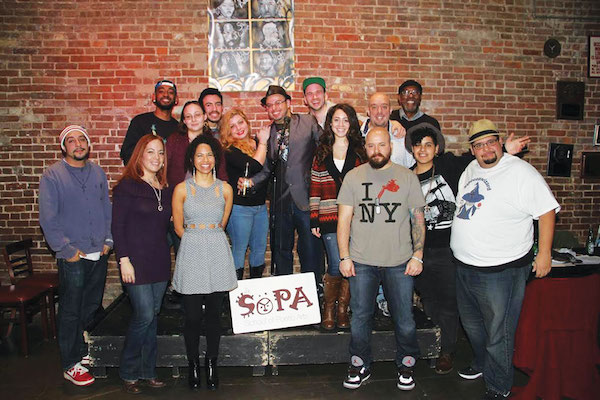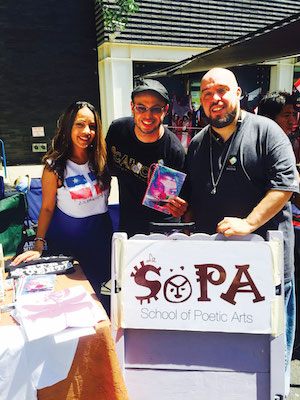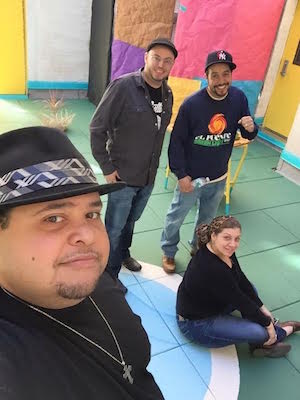
BY PUMA PERL | In my experience, the best writing workshops emphasize building community and sharing the transformative experience of creation. Technique can be taught; a simpatico group of artists evolves. Some years back, I travelled faithfully to the Bronx every Sunday morning. When and how my Saturday night had ended was irrelevant; I needed to write with this family of poets called Acentos. A fierce young woman named Jani Rosado was another dedicated family member, so naturally I was excited to learn of her engagement in a new endeavor.
La Sopa NYC (aka The School of Poetic Arts) is an educational workshop series currently in residence at The Loisaida Center, a Lower East Side nonprofit organization and multi-purpose space born during the activist movements of the 1970s. The series is dedicated to the development of artistic skill and the exploration of literary and performance expression, and its vision and mission are continually expanding. Now in its fourth cycle, “Our emerging pedagogy is that of a Community STEAM [Science, Technology, Engineering, Arts, and Mathematics] program, as it pertains to adult innovators seeking mastery of arts and entrepreneurship,” Rosado noted.
The $150 fee for a six-week session provides many opportunities in addition to the poetry and performance workshops offered weekly. The students, many of whom have never been onstage, are provided platforms for their voices to be heard and their stories to be told. La Sopa participates in events throughout the city, including the Queens Book Festival’s Q-Boro Literary Crawl, the Loisaida Festival, the New York Poetry Festival at Governors Island, and the Union Square Slam. Individual critiques and mentoring are offered via virtual office hours, available to all participants. The courses are not geared toward basic poetry writing skills. A screening process for new applicants is in place in order to sustain a creative dynamic and attract participants who have already developed a relationship with the arts.
Many of the students return, and fresh energy is created between the new and the old. Mario J. Pagan, an emerging poet, midway through his third cycle with the intention to continue, noted, “I keep coming back for the camaraderie. I’ve found peers who are open and eager to teach and to learn from each other, and to master our craft. La Sopa is a community where I have seen anxiety go out the window, shyness kicked to the curb, egos shut down, and self-esteem flying high — a space where all the misfits, late bloomers, nerds, and geeks come together and finally find a place to fit in. But most importantly, we continue the oral tradition of the Nuyorican movement and honor those who came before us.”

The idea for a school had been on poet Juan “Papo Swiggity” Santiago’s mind for some time. Papo and George “Urban Jibaro” Torres founded Capicu Culture, a grassroots house of poetry and performing arts in 2007. In 2009, Papo began seriously thinking about opening a school based on the Nuyorican, Black Arts, and Beat Poet movements. He had recently learned about the Jack Kerouac School of Disembodied Poetics and figured if the Beats could do it, so could he.
Fast-forward a few years and a few attempts later. Co-founder Jani Rosado recalled a late-night gathering at Papo’s place in 2011 as a pivotal moment when, sitting on the steps at sunrise, still talking about their creative work and the community, “I mentioned how much I missed the Acentos workshops. It was like church for many of us — where we went to commune with others and improve ourselves. As I spoke, Papo looked at me like lightning had struck oil; we shared the same dream. The two of us made a pact that night that we would make it happen.”
They eventually agreed on the use of the description “Poetic Arts” because there “is poetry in every form and medium,” said Rosado. “La Sopa, or soup, is the asopao. Throw it all in the pot, simmer it with love, and make something warm and delicious for the family. It’s medicine. Every culture has a special soup that the grandmothers feed you to make you strong and make everything better.”

Before they found their current home, it was Torres who worked tirelessly behind the scenes to create visibility and strengthen the new union with the Loisaida Center — which, in June 2014, joined them on the first Capicu float in the New York Puerto Rican Day Parade. The group expanded to include guest facilitators such as Willie Perdomo and Lemon Anderson, as well as adding teachers and mentors, including former Nuyorican Poets Cafe slam master Keith Roach, hip-hop poetry educator Anthony Morales, and poet/educator/activist, Rich Villar, who wrote, “When I think of this group of writers, I see nothing less than the next wave of a movement. I’m honored to be in their midst. I’m honored to do my part for this nation-building going on at the Loisaida Center. What we are saying at La Sopa is that when you speak your story, in a culture that doesn’t necessarily want to hear your story, you are already participating in a political act.”
In the upcoming session, for the first time, men and women will have separate tracks, so core issues that have previously arisen can be unpacked and further explored in writing.
The fifth cycle of La Sopa will be an abbreviated three-week session, and includes poetry and performance workshops and online mentoring, as well as participation in activities. It will take place 11am–3:30pm on Sat., Aug. 13, 20 & 27, at The Loisaida Center (710 E. Ninth Ave., btw. Aves. C & D;). Applications may be downloaded and submitted, at no cost, via the following link: tinyurl.com/gpecnfa. The series is $75 ($20 each for individual drop-in classes). Those interested in taking individual classes should send three writing samples to lasopanyc@gmail.com for consideration. Visit loisaida.org and capicuculture.com.



































